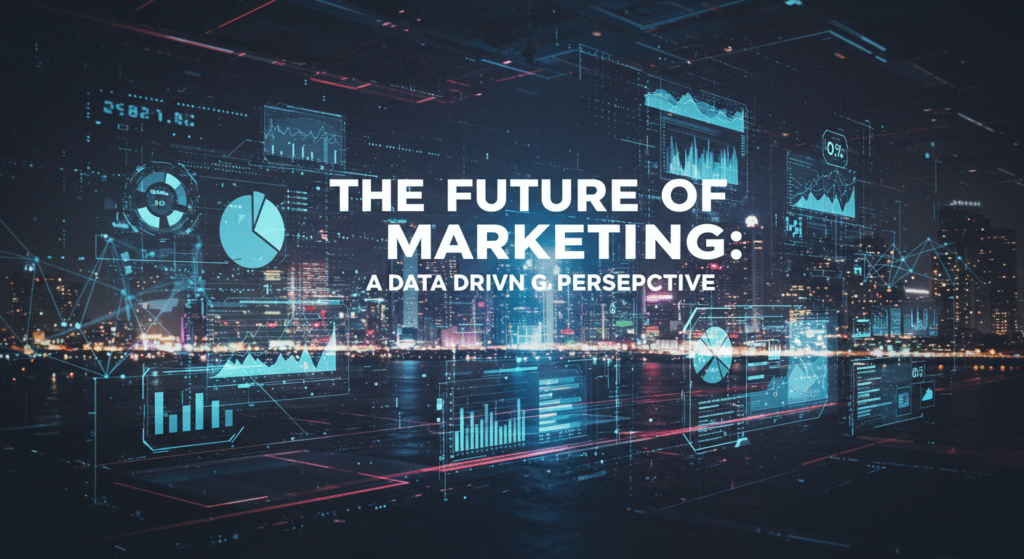
Data-driven marketing has become the heartbeat of successful campaigns. Gone are the days when gut instinct and guesswork led the way. Now, marketing leaders across industries especially in retail are turning to data analytics to sharpen strategies, personalize experiences, and optimize ROI. With the rise of AI in marketing and sophisticated marketing technology, the playing field is changing fast.
This blog is an excerpt from our latest white paper, “The Future of Marketing: A Data-Driven Perspective.“ In it, we explore emerging marketing trends, the critical role of data, and how marketers can prepare for a future shaped by intelligence and innovation. If you’re a retailer or marketer who wants to future-proof your efforts, you’re in the right place.
1. The Future of Marketing: Built on Data and Insight
The future of marketing is intelligent, agile, and deeply personalized and none of it happens without data. As marketing trends continue to evolve, one thing is certain: the most effective brands will be those who embrace data-driven marketing at the core of their strategy. That means not just collecting data, but using data analytics to generate real-time insights and anticipate customer needs.
We’re seeing an acceleration in marketing technology that supports everything from predictive analytics to hyper-personalized content. Retailers can now use AI in marketing to automate email campaigns, deliver tailored product recommendations, and even forecast demand across different customer segments.
The future will not be about reaching the masses. It will be about knowing your customer so well through data that you can create one-to-one experiences at scale.
2. The Role of Data in Future Marketing Strategies
In the next decade, data analytics will no longer be a department it will be a mindset. The role of data in future marketing isn’t just as a support tool; it’s the foundation. From optimizing ad spend to predicting customer behavior, data-driven marketing helps brands make smarter, faster decisions.
With advances in AI in marketing, machine learning algorithms can process vast amounts of customer data to uncover patterns we could never detect manually. Retailers who tap into these tools will be able to forecast trends, automate personalization, and drive more efficient omnichannel strategies.
Marketing technology is also evolving rapidly, integrating seamlessly with CRMs, ad platforms, and social media. These connected ecosystems empower marketers to make data-informed decisions at every touchpoint. The result? Higher conversion rates, better retention, and stronger brand loyalty.
3. Marketing Technology Trends Shaping the Future
Staying ahead of marketing technology trends is essential for businesses looking to remain competitive. From customer data platforms (CDPs) to AI-powered creative tools, today’s marketing technology stack is smarter, more connected, and more automated.
One of the fastest-growing trends is the integration of AI in marketing. From dynamic pricing in retail to real-time campaign optimization, AI is becoming a non-negotiable asset in the data-driven marketing toolkit. And with tools like chatbots and voice search gaining traction, marketers must rethink how they engage with customers in an AI-powered world.
Equally important is the rise of cross-channel analytics. As customers move between online and offline experiences, retailers need unified insights that tell a complete story. That’s where data analytics plays a starring role helping brands create seamless, data-informed journeys that convert.
4. The Importance of Customer Experience in Data-Driven Marketing
At the center of every successful marketing effort lies one goal: creating an exceptional customer experience. And the key to doing that in today’s landscape is you guessed it data-driven marketing.
Retailers can use data analytics to track customer behavior, segment audiences more effectively, and tailor experiences in ways that feel personal and relevant. Whether it’s knowing when to send a re-engagement email or which product a customer is likely to buy next, AI in marketing makes it all possible in real time.
But great experiences don’t come from data alone. They require empathy, storytelling, and strategic use of marketing technology. When all these elements work together, brands can deliver experiences that feel human even when powered by algorithms.
In the end, customers don’t remember ads. They remember how a brand made them feel. Data just gives us the tools to make those feelings consistent and compelling.
In today’s digital age, data has become the backbone of successful Customer Experience strategies. Companies that harness the power of data are able to create personalized, efficient, and impactful customer interactions that drive loyalty and satisfaction. The importance of data-driven decision-making in CX cannot be overstated, as it enables businesses to understand their customers on a deeper level, anticipate their needs, and deliver experiences that resonate.
Data is no longer just a byproduct of business transactions; it is a critical asset that informs every aspect of CX, from customer journey mapping to personalized marketing campaigns. As customer expectations continue to rise, businesses that fail to leverage data risk falling behind their competitors.
5. Ethical Considerations in Data-Driven Marketing
With great data comes great responsibility. As data-driven marketing becomes more sophisticated, so do the ethical challenges. Marketers must be vigilant in how they collect, store, and use data and transparent about it with their customers.
Privacy regulations like GDPR and CCPA are reshaping the data landscape. At the same time, consumer expectations around privacy are rising. Retailers must strike a balance between personalization and respect. Data analytics should serve the customer, not manipulate them.
Using AI in marketing introduces additional complexities. Bias in algorithms, opaque decision-making, and over-targeting are real concerns. That’s why ethical marketing requires both technological skill and human oversight.
The future of marketing must be data-driven, but also values-driven. Ethics, transparency, and trust are not optional they’re foundational.
Final Thoughts: Ready to Lead the Data-Driven Future?
If you’re a marketing professional or retailer, the message is clear: the future belongs to those who embrace data-driven marketing, invest in smart marketing technology, and stay ahead of evolving marketing trends. From AI in marketing to advanced data analytics, the tools are here and the time to act is now.